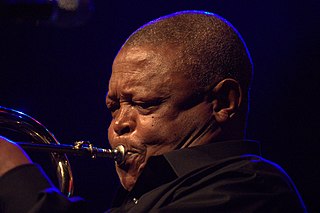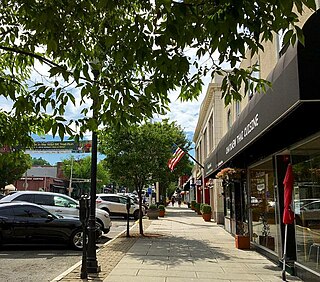African Americans are an ethnic group of Americans with total or partial ancestry from any of the black racial groups of Africa. The term typically refers to descendants of enslaved black people who are from the United States.
Black people is a term used in certain countries, often in socially based systems of racial classification or of ethnicity, to describe persons who are perceived to be dark-skinned compared to other populations. As such, the meaning of the expression varies widely both between and within societies, and depends significantly on context. For many other individuals, communities and countries, "black" is also perceived as a derogatory, outdated, reductive or otherwise unrepresentative label, and as a result is neither used nor defined.

Kwanzaa is a celebration held in the United States and in other nations of the African diaspora in the Americas and lasts a week. The celebration honors African heritage in African-American culture and is observed from December 26 to January 1, culminating in a feast and gift-giving. Kwanzaa has seven core principles. It was created by Maulana Karenga and was first celebrated in 1966–67.

Liberia, officially the Republic of Liberia, is a country on the West African coast. It is bordered by Sierra Leone to its northwest, Guinea to its north, Ivory Coast to its east, and the Atlantic Ocean to its south-southwest. It covers an area of 111,369 square kilometers (43,000 sq mi) and has a population of around 4,700,000 people. English is the official language and over 20 indigenous languages are spoken, representing the numerous ethnic groups who make up more than 95% of the population. The country's capital and largest city is Monrovia.

Soul food is a variety of cuisine originating in the Southeastern United States, and from African American culture. It also has Native American influences. It is common in areas with a historical presence of African Americans and has been a cultural staple among the African American and American Deep-South communities for centuries. The expression "soul food" originated in the mid-1960s, when "soul" was a common word used to describe African American culture.

The Atlantic slave trade or transatlantic slave trade involved the transportation by slave traders of enslaved African people, mainly to the Americas. The slave trade regularly used the triangular trade route and its Middle Passage, and existed from the 16th to the 19th centuries. The vast majority of those who were enslaved and transported in the transatlantic slave trade were people from central and western Africa, who had been sold by other West Africans to Western European slave traders, who brought them to the Americas. The South Atlantic and Caribbean economies especially were dependent on the supply of secure labour for the production of commodity crops, making goods and clothing to sell in Europe. This was crucial to those western European countries which, in the late 17th and 18th centuries, were vying with each other to create overseas empires.
The African diaspora consists of the worldwide collection of communities descended from native Africans or Africa's peoples, predominantly in the Americas. Historically, ethnographers, historians, politicians and writers have used the term particularly to refer to the descendants of the West and Central Africans who were enslaved and shipped to the Americas via the Atlantic slave trade between the 16th and 19th centuries, with their largest populations in Brazil, the United States and Haiti. Some scholars identify "four circulatory phases" of this migration out of Africa. Prior to the Atlantic slave trade, Arab traders took even more slaves from other parts of Africa, selling them to markets in North Africa and the Middle East.

William Edward Burghardt Du Bois was an American sociologist, historian, civil rights activist, Pan-Africanist, author, writer and editor. Born in Great Barrington, Massachusetts, Du Bois grew up in a relatively tolerant and integrated community, and after completing graduate work at the University of Berlin and Harvard, where he was the first African American to earn a doctorate, he became a professor of history, sociology and economics at Atlanta University. Du Bois was one of the founders of the National Association for the Advancement of Colored People (NAACP) in 1909.

Hugh Ramapolo Masekela was a South African trumpeter, flugelhornist, cornetist, singer and composer who has been described as "the father of South African jazz". Masekela was known for his jazz compositions and for writing well-known anti-apartheid songs such as "Soweto Blues" and "Bring Him Back Home". He also had a number-one US pop hit in 1968 with his version of "Grazing in the Grass".

Afrocentrism is an approach to the study of world history that focuses on the history of people of recent African descent. It is in some respects a response to global (Eurocentric) attitudes about African people and their historical contributions; it seeks to correct what it sees as mistakes and ideas perpetuated by the racist philosophical underpinnings of western academic disciplines as they developed during and since Europe's Early Renaissance as justifying rationales for the enslavement of other peoples, in order to enable more accurate accounts of not only African but all people's contributions to world history. Afrocentricity deals primarily with self-determination and African agency and is a Pan-African point of view for the study of culture, philosophy, and history.

The Great Migration, sometimes known as the Great Northward Migration, or the Black Migration, was the movement of six million African Americans out of the rural Southern United States to the urban Northeast, Midwest, and West that occurred between 1916 and 1970. In every U.S. Census prior to 1910, more than 90 percent of the African-American population lived in the American South. In 1900, only one-fifth of African Americans living in the South were living in urban areas. By the end of the Great Migration, just over 50 percent of the African-American population remained in the South, while a little less than 50 percent lived in the North and West, and the African-American population had become highly urbanized. By 1960, of those African Americans still living in the South, half now lived in urban areas, and by 1970, more than 80 percent of African Americans nationwide lived in cities. In 1991, Nicholas Lemann wrote that:
The Great Migration was one of the largest and most rapid mass internal movements in history—perhaps the greatest not caused by the immediate threat of execution or starvation. In sheer numbers it outranks the migration of any other ethnic group—Italians or Irish or Jews or Poles—to [the United States]. For blacks, the migration meant leaving what had always been their economic and social base in America, and finding a new one.
African-American Vernacular English (AAVE), known less precisely as Black Vernacular, Black English Vernacular (BEV), Black Vernacular English (BVE) or colloquially Ebonics, is the variety of English natively spoken by most working- and middle-class African Americans and some Black Canadians, particularly in urban communities. Having its own unique grammatical, vocabulary and accent features, African-American Vernacular English is employed by middle-class African Americans as the more informal and casual end of a sociolinguistic continuum; on the formal end of this continuum, middle-class African-Americans switch to more standard English grammar and vocabulary, usually while retaining elements of the nonstandard accent.
African-American culture, also known as Black American culture, refers to the contributions of African Americans to the culture of the United States, either as part of or distinct from mainstream American culture. The distinct identity of African-American culture is rooted in the historical experience of the African-American people, including the Middle Passage. The culture is both distinct and enormously influential on American and global worldwide culture as a whole.
White Americans are Americans who are descendants from any of the white racial groups of Europe, the Middle East and North Africa or in census statistics, those who self-report as white based on having majority-white ancestry. White Americans constitute the historical and current majority of the people living in the United States, with 72% of the population in the 2010 United States Census. Non-Hispanic whites totaled about 197,285,202 or 60.7% of the U.S. population. European Americans are the largest ethnic group of White Americans and constitute the historical population of the United States since the nation's founding.
Race and ethnicity in the United States is a complex topic both because the United States has a racially and ethnically diverse population and because the country has a heavily racist past involving slavery and anti-miscegenation laws. At the federal level, race and ethnicity have been categorized separately.
The Harlem Renaissance was an intellectual, social, and artistic explosion centered in Harlem, New York, spanning the 1920s. At the time, it was known as the "New Negro Movement", named after The New Negro, a 1925 anthology edited by Alain Locke. The movement also included the new African-American cultural expressions across the urban areas in the Northeast and Midwest United States affected by the Great Migration, of which Harlem was the largest.
Jim Crow laws were state and local laws that enforced racial segregation in the Southern United States. All were enacted in the late 19th and early 20th centuries by white Democratic-dominated state legislatures after the Reconstruction period. The laws were enforced until 1965. In practice, Jim Crow laws mandated racial segregation in all public facilities in the states of the former Confederate States of America, starting in the 1870s and 1880s, and were upheld in 1896, by the U.S. Supreme Court's "separate but equal" legal doctrine for facilities for African Americans, established with the court's decision in the case of Plessy vs. Ferguson. Moreover, public education had essentially been segregated since its establishment in most of the South, after the Civil War (1861–65).

A continent is one of several very large landmasses of the world. Generally identified by convention rather than any strict criteria, up to seven regions are commonly regarded as continents. Ordered from largest in area to smallest, they are: Asia, Africa, North America, South America, Antarctica, Europe, and Australia.

Americans are nationals and citizens of the United States of America. Although nationals and citizens make up the majority of Americans, some dual citizens, expatriates, and permanent residents may also claim American nationality. The United States is home to people of many different ethnic origins. As a result, American culture and law does not equate nationality with race or ethnicity, but with citizenship and permanent allegiance.

Henry Louis "Skip" Gates Jr. is an American literary critic, teacher, historian, filmmaker and public intellectual who currently serves as the Alphonse Fletcher University Professor and Director of the Hutchins Center for African and African American Research at Harvard University. He discovered what are considered the earliest known literary works of African-American writers, and has published extensively on appreciating African-American literature as part of the Western canon.












